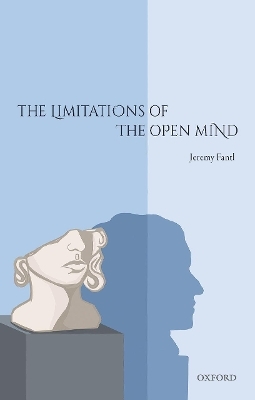
The Limitations of the Open Mind
Seiten
2018
Oxford University Press (Verlag)
978-0-19-880795-7 (ISBN)
Oxford University Press (Verlag)
978-0-19-880795-7 (ISBN)
When we should engage with those we disagree with? Jeremy Fantl argues that sometimes we can know that arguments for controversial ideas go wrong even without engaging critically with them or figuring out where they err. Sometimes we shouldn't engage critically with an argument and, if we do engage, we shouldn't engage open-mindedly.
When should you engage with difficult arguments against your cherished controversial beliefs? The primary conclusion of this book is that your obligations to engage with counterarguments are more limited than is often thought. In some standard situations, you shouldn't engage with difficult counterarguments and, if you do, you shouldn't engage with them open-mindedly. This conclusion runs counter to aspects of the Millian political tradition and political liberalism, as well as what people working in informal logic tend to say about argumentation.
Not all misleading arguments wear their flaws on their sleeve. Each step of a misleading argument might seem compelling and you might not be able to figure out what's wrong with it. Still, even if you can't figure out what's wrong with an argument, you can know that it's misleading. One way to know that an argument is misleading is, counterintuitively, to lack expertise in the methods and evidence-types employed by the argument.
When you know that a counterargument is misleading, you shouldn't engage with it open-mindedly and sometimes shouldn't engage with it at all. You shouldn't engage open-mindedly because you shouldn't be willing to reduce your confidence in response to arguments you know are misleading. And you sometimes shouldn't engage closed-mindedly, because to do so can be manipulative or ineffective.
In making this case, Jeremy Fantl discusses echo chambers and group polarization, the importance in academic writing of a sympathetic case for the opposition, the epistemology of disagreement, the account of open-mindedness, and invitations to problematic academic speakers.
When should you engage with difficult arguments against your cherished controversial beliefs? The primary conclusion of this book is that your obligations to engage with counterarguments are more limited than is often thought. In some standard situations, you shouldn't engage with difficult counterarguments and, if you do, you shouldn't engage with them open-mindedly. This conclusion runs counter to aspects of the Millian political tradition and political liberalism, as well as what people working in informal logic tend to say about argumentation.
Not all misleading arguments wear their flaws on their sleeve. Each step of a misleading argument might seem compelling and you might not be able to figure out what's wrong with it. Still, even if you can't figure out what's wrong with an argument, you can know that it's misleading. One way to know that an argument is misleading is, counterintuitively, to lack expertise in the methods and evidence-types employed by the argument.
When you know that a counterargument is misleading, you shouldn't engage with it open-mindedly and sometimes shouldn't engage with it at all. You shouldn't engage open-mindedly because you shouldn't be willing to reduce your confidence in response to arguments you know are misleading. And you sometimes shouldn't engage closed-mindedly, because to do so can be manipulative or ineffective.
In making this case, Jeremy Fantl discusses echo chambers and group polarization, the importance in academic writing of a sympathetic case for the opposition, the epistemology of disagreement, the account of open-mindedness, and invitations to problematic academic speakers.
Jeremy Fantl received his PhD in Philosophy from Brown University in 2000. He started his current position at the University of Calgary in 2006 and works primarily in epistemology. He is co-author, with Matthew McGrath, of Knowledge in an Uncertain World (OUP 2009).
Part I: The Epistemology of Open-Mindedness
1: Open-Mindedness
2: A Defense of (a different kind of) Dogmatism
3: The Epistemic Efficacy of Amateurism
4: Psychic Phenomena and the Existence of God
Part II: The Ethics of Participation in Argumentation
5: The Obligation to Engage
6: Against Open-Minded Engagement (for Some People)
7: Against Closed-Minded Engagement (in Some Situations)
8: On Inviting Problematic Speakers to Campus
| Erscheinungsdatum | 29.05.2018 |
|---|---|
| Verlagsort | Oxford |
| Sprache | englisch |
| Maße | 163 x 241 mm |
| Gewicht | 542 g |
| Themenwelt | Geisteswissenschaften ► Philosophie ► Allgemeines / Lexika |
| Geisteswissenschaften ► Philosophie ► Erkenntnistheorie / Wissenschaftstheorie | |
| Geisteswissenschaften ► Philosophie ► Ethik | |
| ISBN-10 | 0-19-880795-3 / 0198807953 |
| ISBN-13 | 978-0-19-880795-7 / 9780198807957 |
| Zustand | Neuware |
| Haben Sie eine Frage zum Produkt? |
Mehr entdecken
aus dem Bereich
aus dem Bereich
die letzten Jahre der Philosophie und der Beginn einer neuen …
Buch | Hardcover (2024)
Klett-Cotta (Verlag)
CHF 39,20
Gesundheitsschutz, Selbstbestimmungsrechte, Rechtspolitik
Buch | Softcover (2024)
Kohlhammer (Verlag)
CHF 54,60
Jenseits von Identität | Ausgezeichnet mit dem Leipziger Buchpreis …
Buch | Softcover (2023)
Ullstein Taschenbuch Verlag
CHF 19,55


